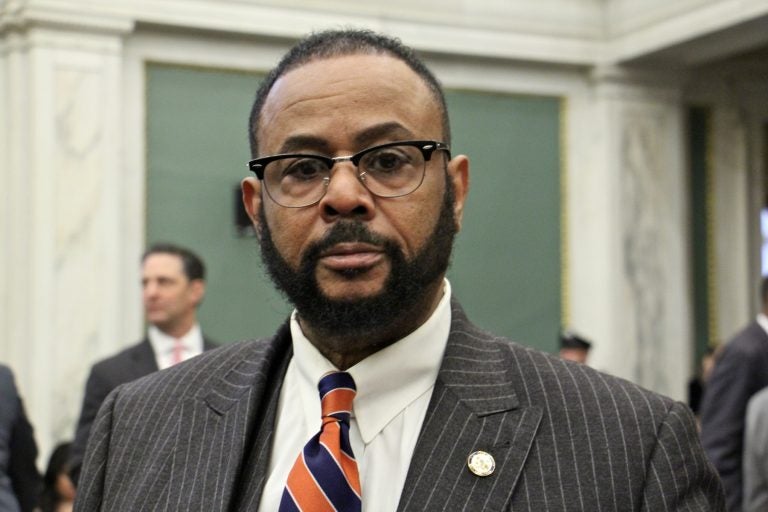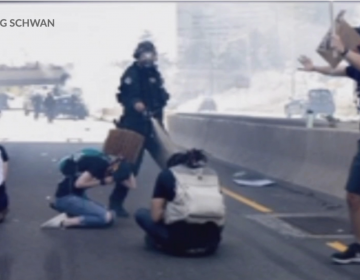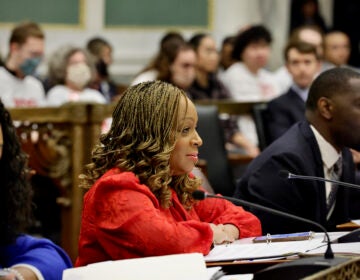‘Watershed moment’: Philly’s new police oversight board moves forward
A Philadelphia City Council committee overwhelmingly passed legislation laying out the duties and powers of the new Citizens Police Oversight Commission.

City Councilmember Curtis Jones. (Emma Lee/WHYY)
Philadelphia is one step closer to establishing an independent and permanent watchdog group to investigate allegations of police misconduct.
A City Council committee on Monday overwhelmingly passed legislation that details the duties and powers of the new Citizens Police Oversight Commission, which will replace the current Police Advisory Commission, a group that has long lacked the authority and funding to make lasting change.
“There are times in history when you can see a thing that needs change, but you do not have the ability to change it. There are other times in history when you see a thing that needs changing and you do have the ability to make that change. In Philadelphia today, this is that time,” said City Councilmember Curtis Jones Jr., who introduced the bill in February.
The 14-1 committee vote followed nearly four hours of testimony from city officials, civil rights attorneys, police reform advocates, and the general public. Nearly all of those who spoke support the legislation, which is scheduled to be voted on by the full council next week.
Leadership of the Fraternal Order of Police Lodge 5, which is actively negotiating with the city on a new contract, did not testify on Monday. In an email, a spokesperson for the union declined to comment.
If passed, the city’s goal is to officially launch the Citizens Police Oversight Commission in July. Backers hope the new group can boost police accountability and help restore public trust in the Philadelphia Police Department, especially within communities of color, where residents are disproportionately stopped by officers and subjected to use of force.
“This is not about besmirching the names of officers. This is about holding those who have the power to arrest, and take your life, to a standard that we all agree should be a higher standard,” said state Rep. Jordan Harris, who represents parts of South, Southwest, and West Philadelphia.
An independent analysis of citizen complaints filed against police officers between 2015 and 2020, obtained by WHYY News, found those officers faced formal discipline less than 1% of the time.
Under Jones’ bill, part of a package of police reforms fast-tracked after the murder of George Floyd in Minneapolis, the commission would investigate all citizen complaints filed against officers and the department. The body could then recommend discipline if it found the allegations of misconduct were substantiated.
For the first time, the city’s police commissioner would have to respond to those recommendations in writing and explain why they did or did not follow through on the commission’s recommendations, including disciplinary ones.
The commission would have the power to investigate allegations of physical abuse, bribery, corruption, intimidation, and harassment, as well as “any allegation that threatens the integrity of the criminal justice process,” according to the bill, including instances when an officer discharges their service weapon.
Under the measure, the commission could also make recommendations on any of the department’s policies and procedures, as well as hold a vote of no confidence in the police commissioner — another first.
“This bill marks a watershed moment in policing, not just for Philadelphia, but for the nation,” said Anthony Erace, who leads the current Police Advisory Commission.
“Raising the standards of accountability, transparency, and professionalism in the Philadelphia Police Department will make the department better and, more importantly, it will foster legitimacy, which is something that no police department can function without,” he added.
If passed, the agency will consist of nine voting members picked by a five-member selection panel appointed by the mayor and City Council. Nominees for the commission must be Philadelphia residents and reflect the “diversity of the population and geography of the city.” They cannot be former or current officers with the police department.
The commissioners, who will be compensated, will serve four-year terms. They must also be trained in use-of-force protocols, the police department’s internal affairs process, and constitutional law, among other requirements.
The agency will also have a full-time staff, including an executive director and chief counsel.
A number of speakers who testified on Monday brought up the commission’s budget, which policing experts say will be critical to the group’s ability to successfully execute the mandate detailed in Jones’ legislation.
“For those of you who say we can’t find the money, the mayor’s budget has about $12 million a year over, I think, five years for street sweeping of trash. If we can find $12 million a year for trash, then certainly we can find at least that and more to save Black lives,” said Rev. Mark Tyler, co-chair of the POWER’s Live Free Campaign which was launched to end police violence and mass incarceration. The interfaith group organized and hosted eight town hall meetings last year on the Citizens Police Oversight Commission.
Mayor Jim Kenney’s latest budget proposal calls for nearly $10 million for the commission over the next five fiscal years, including $1.9 million for fiscal year 2022.
Unlike similar police oversight groups in other big cities like New York and Chicago, the commission’s budget would not be a fixed percentage of the police department’s budget.
Jones is proposing a three-phase budget for the commission that begins with $1.9 million on July 1 and ends with an additional $13.6 million at the start of fiscal year 2023, according to a copy of the proposal obtained by WHYY News.
By phase three of the proposal, the commission would have nearly 100 investigators on staff. Their salaries would account for nearly half of the group’s budget.
The fiscal year 2021 budget for the police department is roughly $727 million. The budget for its Internal Affairs Bureau is about $15 million, according to police.
The current Police Advisory Commission’s budget is less than $600,000 following pandemic-related budget cuts, and has only six staffers tasked with overseeing the nation’s fourth-largest police department.
The Kenney administration and City Council also continue to negotiate on the language and duties of the Citizens Police Advisory Commission.
“We are actively working with Council to develop a structure of the commission, and how the budget will align to support the goals of the organization,” said city spokesperson Mike Dunn said last month. “The commission’s funding will enable it to fulfill its mandate and is independent of police funding.”

Get daily updates from WHYY News!
WHYY is your source for fact-based, in-depth journalism and information. As a nonprofit organization, we rely on financial support from readers like you. Please give today.







